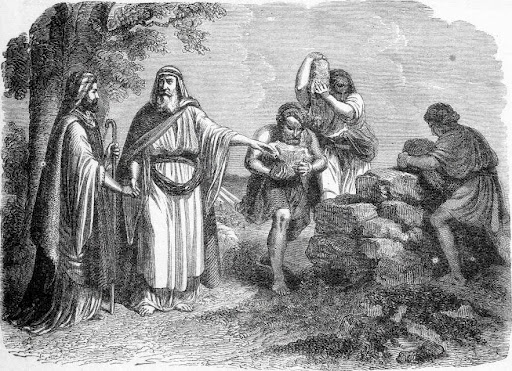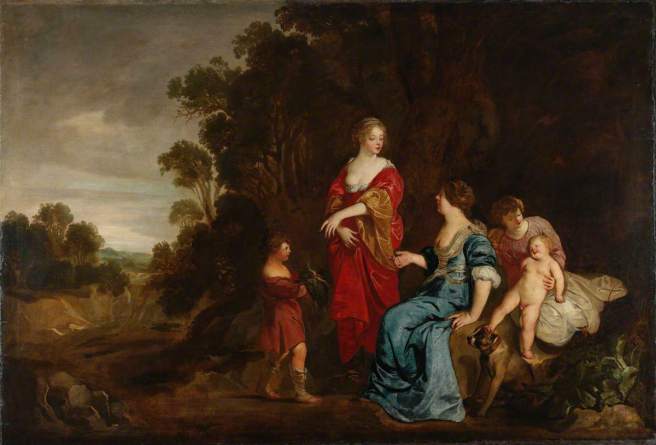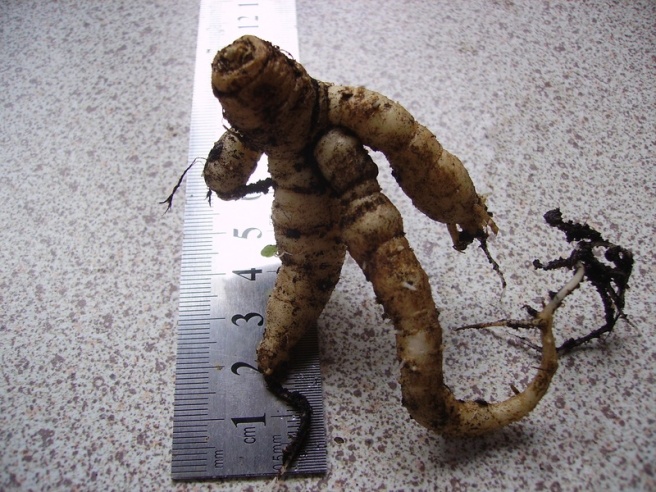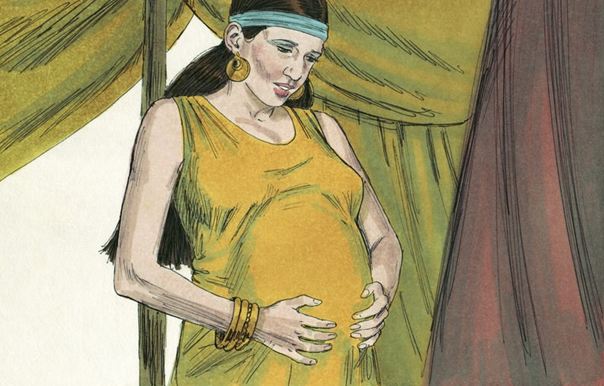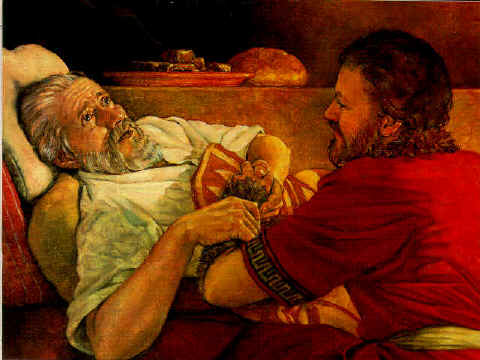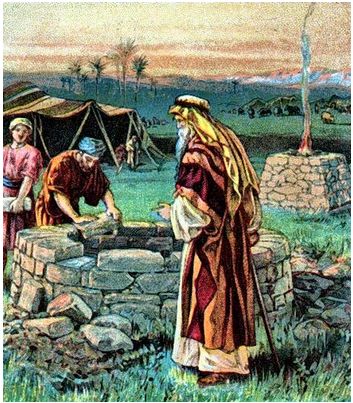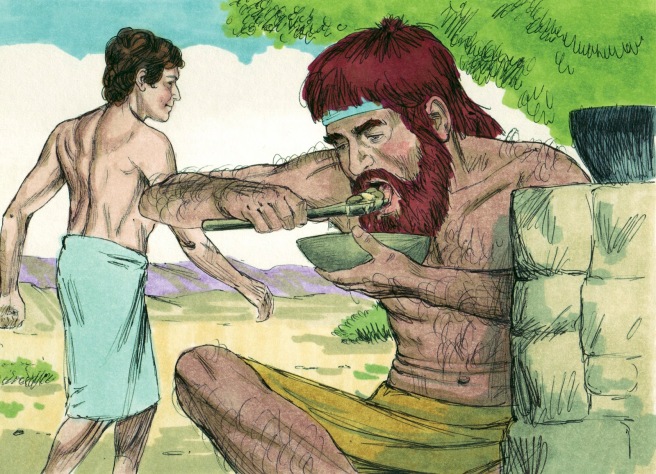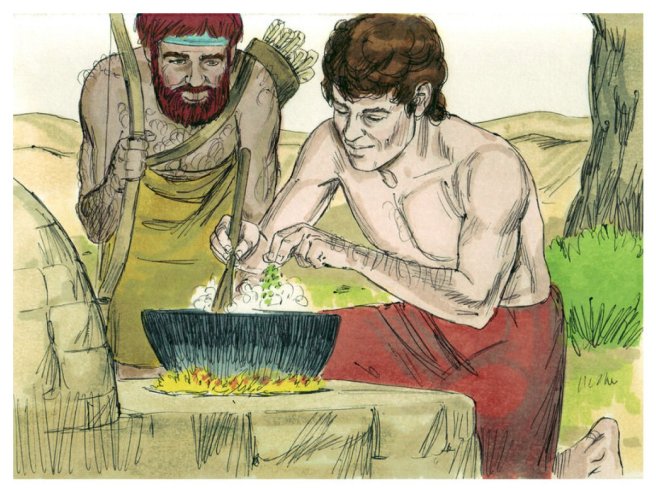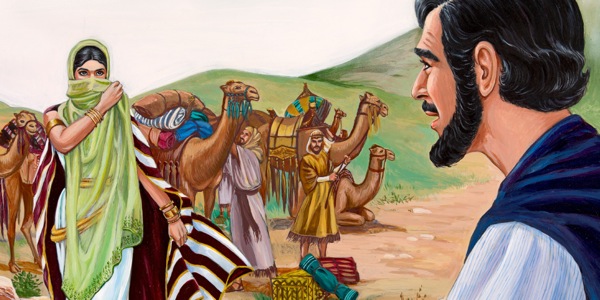Jacob departs after his covenant with Laban, and on his way he meets angels of God, saying, “this is God’s army” so now we have a place named Mahanaim for this reason.
At this point, these angels remain nameless.
And he seeks out his brother Esau:
Genesis 32:3 – And Jacob sent messengers before him to Esau his brother unto the land of Seir, the field of Edom. And he commanded them, saying, Thus shall ye say unto my lord Esau: Thus saith they servant Jacob, I have sojourned with Laban, and stayed until now: and I have oxen, and asses, and flocks, and men-servants, and maid-servants: and I have sent to tell my lord, that I may find favor in thy sight.
14 years is a long time to be away from family, so this sounds like a reaching out of peace to his brother who he deceived twice, and who he knew wished him dead. His messengers return to tell Jacob his brother is indeed coming, but with 400 men. Jacob is frightened and splits his camp in two, so that if Esau was to attack and wipe out one, at least the other would survive. Jacob prays to Jehovah asking for protection, repeating the promise back to Jehovah he was told he would receive. He REALLY must have been in fear if he reaches out to Jehovah this time, which isn’t surprising knowing what he did to his brother.
Jacob gathers a large gift in hopes to appease Esau before he arrives: 200 female goats and 20 male goats, 200 ewes and 20 rams, 30 milch camels and their colts, 40 cows and 10 bulls, 20 female donkeys and 10 foals. He sent each group forward, separate from each other (goats separate from rams, etc.) so that as Esau approached each group, he would be told that they are gifts from his brother Jacob to appease him in the hopes he will accept him. The groups he divided travel on to perform their mission and Jacob prepares:
32:22 – And he rose up that night, and took his two wives, and his two handmaids, and his 11 children, and passed over the ford of Jabbok. And he took them, and sent them over the stream, and sent over that which he had. And Jacob was left alone; and there wrestled a man with him until the breaking of the day. And when he saw that he prevailed not against him, he touched the hollow of his thigh; and the hollow of Jacob’s thigh was strained, as he wrestled with him. And said, Let me go, for the day breaketh. And he said, I will not let thee go, except thou bless me. And he said unto him, What is they name? And he said, Jacob. And he said, They name shall be called no more Jacob, but Israel: for thou has striven with God and with men, and hast prevailed. And Jacob asked him, and said, Tell me, I pray thee, thy name. And he said, Wherefore is it that thou dost ask after my name?
So how did this work? As he sat alone a man comes along and start wrestling him and they grapple until the sun rises? Was it customary for men to randomly wrestle strangers, if so, what for? This is the first time the Bible has mentioned wrestling, will it occur again?
As the story ends, I am reminded of the vision of Abraham and Jehovah where Abraham’s horror/dream ends as the sun rises. What is it about the sun rise that causes these supernatural events to cease? Is Jehovah primarily nocturnal? Similar to what we would know as a vampire? Does he require blood?
So thanks to this event, Jacob’s name is now Israel, he has a limp, and the children of Israel do not eat “the sinew of the hip which is upon the hollow of the thigh, unto this day” because this man touched the hollow of Jacob’s thigh. Is this “sinew of the hip which is upon the hollow of the thigh” party of every animal’s anatomy? Or just humans?
I’m pretty sure there is anatomical term for this sinew, a quick Internet search has not given me an answer yet.
So what exactly is “touched” in this case? A mere finger brush? A strike? A penetration through the skin like a stabbing? I’d also be interested in a physiologist’s interpretation of this event. Does sinew = muscle so he suffered a muscle strain? A torn ligament? Not being pastoralists or butchers of animals, most people today wouldn’t understand “the sinew of the hip which is upon the hollow of the thigh”. I, in my basic understanding, would say this is a hip ligament that connects to the thigh bone (the hollow of the thigh, knowing that dried bones are hollow). Only someone who has butchered an animal (or a human!) would know what this means in human anatomy.
SIDE NOTE!
Other biblical versions are saying that this “man” was actually an angel, so suddenly the deviation of Biblical texts from one another are really throwing a wrench in translation. We are told this was a man in ASV, but after Jacob gets his revelation of his new name, he claims he has seen God face to face (32:30). So it’s been established, according to Jacob/Isaac, God can take the form of a man and the Bible will simply describe him as “a man”. A mystery man if you will.
Stepping on over to KJV, I now see that Jacob’s name Israel was defined “A prince of God”. Isra-prince, El-God? Isra sounds alot like Ezra. This ASV verse I quoted above leaves out the “prince” word, and it completely changes the interpretation in my eyes and mind.
With all these translations, versions, interpretations, how in the world is anyone supposed to find the truth? Yet I know there are churches out there, non-denominational, Born Again, Protestant, Catholic, and every mix in between that says there’s is the truth, and because they claim to be holders of the truth, they turn on and attack one another. And the followers and parishioners of each attack the other.
If this “book” in it’s multiple versions, truly was the word of God, why are there so many variations? Is this a Tower of Babel type confusion put upon the people of the earth? Not only do we speak multiple languages, but the Bible has become a series of different languages/interpretations!
Believers out there: Why should someone, with no preconceived notions about this book, who has collated a long list of inconsistencies within and among different versions of this book, not just shelve the book and move on to other fruitful endeavors?
My bet: I’d get hundred’s of different answers, most dealing with a punishment of Hell, and I’d put money on that the answers were not found in the Bible, but in individual’s translations of this Bible, negating their answers as FACT. I don’t want opinions or conjecture, I want the truth. I’d see 100 versions of the “truth” at this juncture, then 100 more, until at some point I close my eyes and ears to modern man’s Bible and wait for divine intervention to answer me.
In the meantime I would live my life in peace, with respect to all life around me, with respect to the mystery of creation and this universe, helping my fellow man/those in need to the best of my ability, nurturing future generations, respecting righteousness and fair law.
BUT, because I didn’t say those “magic words” (and you born agains know who you are and what those words are) and because I can point out inconsistencies in the Bible (from the very beginning in Genesis Books 1 and 2) I guess I’m going to burn in Hell?
Well, if hell is where I go and you arrogant Christians are not there with your falsehoods and judgements, maybe it’s not so bad.
One of the reasons I started this blog was because a friend of mine had two “Christian” women tell him he was going to hell for believing the Bible contradicted itself. When he tried to prove his point with actual verse (again, try Genesis Books 1 and 2), they laughed at him and walked away mid-sentence. They mocked him. I took up the figurative sword and shield and started reading on my own and found, that, right off the bat, the contradictions do indeed start piling up.
This is a good time for a break. Maybe the spark of divination, that same spark I had when I was very young and proved the presence of the universal force of peace and balance, and gave me belief in God, will come back and give me direction. In the meantime, this book (or books since there are so many variations) gets closed up.
